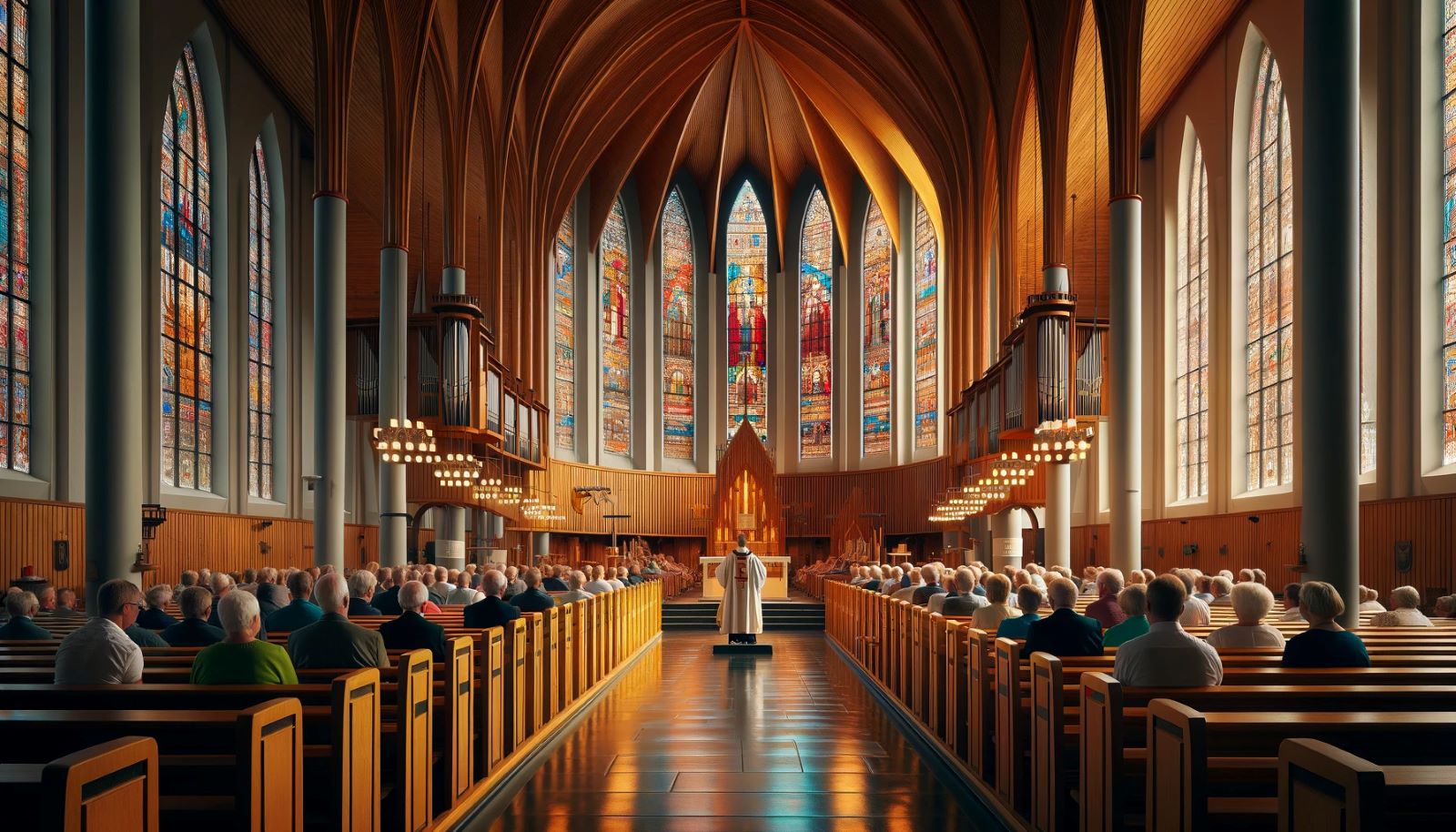Home>Arts and Culture>What Is A Cathedral School


Arts and Culture
What Is A Cathedral School
Published: February 16, 2024
Peter Smith, Editorial Director at Christian.net, combines deep insights into faith, politics, and culture to lead content creation that resonates widely. Awarded for his contributions to religious discourse, he previously headed a major organization for religious communicators, enhancing dialogue on faith's societal impacts.
Discover the rich tradition of arts and culture at a cathedral school. Explore the unique educational opportunities and vibrant community.
(Many of the links in this article redirect to a specific reviewed product. Your purchase of these products through affiliate links helps to generate commission for Christian.net, at no extra cost. Learn more)
Table of Contents
Introduction
Cathedral schools, with their rich historical significance and enduring educational legacy, hold a distinguished place in the realm of academic institutions. These venerable establishments, often associated with cathedrals or churches, have played a pivotal role in shaping the intellectual and spiritual development of students for centuries. As we delve into the world of cathedral schools, we will uncover the profound impact they have had on education, culture, and society.
The origins of cathedral schools can be traced back to the early Middle Ages, where they emerged as centers of learning within the precincts of cathedrals and monasteries. These institutions were instrumental in preserving and transmitting knowledge during a time marked by intellectual fervor and religious devotion. Over the centuries, cathedral schools have evolved, adapting to the changing educational landscape while upholding their commitment to academic excellence and moral guidance.
Today, cathedral schools continue to embody a unique blend of tradition and innovation, offering a holistic educational experience that integrates intellectual pursuits with spiritual growth. With a focus on nurturing the whole person, these schools provide a supportive environment where students can explore their academic interests while cultivating a sense of moral responsibility and ethical awareness.
As we embark on this exploration of cathedral schools, we will uncover the defining characteristics that set them apart from other educational institutions. From their emphasis on character formation to their integration of religious teachings into the curriculum, cathedral schools stand as bastions of values-based education, fostering a sense of community and purpose among their students.
In the subsequent sections, we will delve deeper into the history, curriculum, and unique attributes of cathedral schools, shedding light on the enduring relevance of these venerable institutions in today's educational landscape. Join us on this enlightening journey as we unravel the timeless allure and profound significance of cathedral schools.
Read more: 15 Prayers Before School
History of Cathedral Schools
The history of cathedral schools is deeply intertwined with the cultural and intellectual tapestry of medieval Europe. These educational institutions emerged during the early Middle Ages, serving as centers of learning within the precincts of cathedrals and monasteries. The roots of cathedral schools can be traced back to the 6th century, when they played a pivotal role in preserving and transmitting knowledge during a time marked by profound intellectual and religious fervor.
One of the earliest and most renowned cathedral schools was the Palace School of Charlemagne, established in the late 8th century in Aachen, Germany. Under the patronage of Charlemagne, this institution became a beacon of scholarship and classical learning, laying the groundwork for the Carolingian Renaissance. The Palace School of Charlemagne exemplified the close association between cathedral schools and the ecclesiastical and secular authorities of the time, underscoring their significance as centers of intellectual and cultural influence.
During the medieval period, cathedral schools flourished across Europe, with notable establishments in cities such as Paris, Chartres, and Canterbury. These schools were instrumental in shaping the intellectual landscape of the era, nurturing a cadre of scholars, theologians, and scribes who made enduring contributions to literature, theology, and philosophy. The curriculum of cathedral schools encompassed a wide array of subjects, including Latin grammar, rhetoric, arithmetic, music, and theology, reflecting the diverse and comprehensive nature of medieval education.
The influence of cathedral schools extended beyond the confines of academia, permeating the fabric of medieval society. As centers of learning and piety, these institutions played a crucial role in the preservation of knowledge, the cultivation of religious devotion, and the dissemination of cultural heritage. The scholars and clergy who emerged from cathedral schools wielded significant influence, shaping the intellectual discourse and spiritual ethos of their time.
Over the centuries, cathedral schools evolved in response to changing educational paradigms and societal dynamics. While their prominence waned during the Renaissance and the subsequent rise of humanist education, the enduring legacy of cathedral schools endured, laying the groundwork for the modern educational institutions that followed.
Today, cathedral schools continue to honor their historical legacy while embracing contemporary educational principles, embodying a seamless fusion of tradition and innovation. The rich history of cathedral schools serves as a testament to their enduring relevance and enduring impact on the educational landscape, embodying a legacy of intellectual rigor, moral guidance, and cultural stewardship.
Characteristics of Cathedral Schools
Cathedral schools are distinguished by a set of defining characteristics that set them apart from other educational institutions. These unique attributes encompass a holistic approach to education, a strong emphasis on character formation, and a commitment to integrating religious teachings into the fabric of academic life.
Holistic Education:
Cathedral schools are renowned for providing a holistic educational experience that goes beyond academic instruction. These institutions prioritize the development of the whole person, nurturing students' intellectual, emotional, and spiritual growth. By fostering a supportive and inclusive environment, cathedral schools aim to cultivate well-rounded individuals who are equipped to navigate the complexities of the modern world with resilience and empathy.
Emphasis on Character Formation:
Central to the ethos of cathedral schools is the cultivation of moral and ethical values. These institutions place a strong emphasis on character formation, instilling virtues such as integrity, compassion, and social responsibility in their students. Through a combination of formal instruction, mentorship, and community engagement, cathedral schools seek to nurture individuals of exemplary character who are committed to making positive contributions to society.
Read more: Religious Diversity in Schools
Integration of Religious Teachings:
Religious education holds a prominent place within the curriculum of cathedral schools. Rooted in the traditions of the Christian faith, these institutions integrate religious teachings into various facets of academic life, fostering a deep sense of spiritual awareness and moral grounding. Students are encouraged to explore questions of faith, ethics, and social justice, allowing them to develop a nuanced understanding of their religious heritage while engaging in thoughtful dialogue and introspection.
Commitment to Academic Excellence:
While prioritizing character development and spiritual growth, cathedral schools maintain a steadfast commitment to academic excellence. The rigorous academic programs offered at these institutions are designed to challenge and inspire students, nurturing a passion for learning and intellectual inquiry. By upholding high standards of scholarship and critical thinking, cathedral schools empower students to excel academically while embracing a spirit of intellectual curiosity and creativity.
Fostering a Sense of Community:
Cathedral schools foster a strong sense of community and belonging, creating a supportive network of students, faculty, and staff. This communal ethos promotes collaboration, empathy, and mutual respect, fostering a nurturing environment where individuals can thrive academically and personally. Through shared traditions, communal worship, and service-oriented initiatives, cathedral schools cultivate a spirit of unity and fellowship among their members.
In essence, the characteristics of cathedral schools reflect a commitment to nurturing the intellectual, moral, and spiritual dimensions of education. By embracing a holistic approach to learning, prioritizing character formation, integrating religious teachings, upholding academic excellence, and fostering a sense of community, cathedral schools continue to uphold their legacy as bastions of values-based education and intellectual inquiry.
Curriculum and Education at Cathedral Schools
The curriculum and educational framework at cathedral schools are meticulously designed to provide a comprehensive and enriching learning experience that transcends traditional academic instruction. Rooted in a commitment to holistic education, these institutions offer a diverse array of subjects and activities aimed at nurturing the intellectual, moral, and spiritual dimensions of students' development.
Read more: 15 School Prayers For Students And Teachers
Multifaceted Academic Programs
Cathedral schools boast multifaceted academic programs that encompass a wide spectrum of disciplines, including humanities, sciences, languages, and the arts. The curriculum is thoughtfully structured to foster intellectual curiosity and critical thinking, encouraging students to explore diverse fields of knowledge while honing their analytical and creative abilities. From literature and history to mathematics and natural sciences, the academic offerings at cathedral schools are designed to inspire a love for learning and a deep appreciation for the richness of human knowledge.
Emphasis on Classical Languages and Literature
Central to the educational ethos of cathedral schools is the study of classical languages, particularly Latin and Greek. These timeless languages serve as gateways to the literary and philosophical heritage of ancient civilizations, providing students with a profound understanding of linguistic roots and cultural traditions. By delving into classical literature and philosophical texts, students gain insights into the enduring themes of human experience, fostering a deep appreciation for the interconnectedness of historical narratives and contemporary discourse.
Integration of Religious Studies
Religious studies form an integral part of the curriculum at cathedral schools, reflecting the institutions' commitment to nurturing spiritual awareness and moral grounding. Through the exploration of religious texts, ethical teachings, and theological inquiries, students engage in thoughtful dialogue and introspection, developing a nuanced understanding of faith, ethics, and social responsibility. The integration of religious studies enriches students' intellectual and spiritual growth, fostering a sense of reverence and ethical discernment that transcends academic pursuits.
Enrichment through Music and Arts
Cathedral schools place a strong emphasis on the enrichment of students' artistic and creative faculties. Music, art, and architecture are celebrated as integral components of the educational experience, offering students opportunities to explore their expressive talents and cultivate an appreciation for aesthetic beauty. Whether through choral performances, visual arts, or architectural studies, students are encouraged to embrace the transformative power of artistic expression, fostering a deep connection to cultural heritage and creative innovation.
Read more: 15 Good Luck Back To School Prayer Quotes
Ethical and Philosophical Inquiry
The curriculum at cathedral schools incorporates ethical and philosophical inquiry, providing students with opportunities to grapple with profound questions of morality, human existence, and societal values. Through the study of ethics, philosophy, and moral theology, students engage in reflective discourse, honing their capacity for ethical reasoning and empathetic understanding. This intellectual exploration equips students with the tools to navigate complex ethical dilemmas and societal challenges, fostering a sense of moral responsibility and ethical discernment.
In essence, the curriculum and educational framework at cathedral schools reflect a commitment to nurturing the intellectual, moral, and spiritual dimensions of students' development. By offering multifaceted academic programs, emphasizing classical languages and literature, integrating religious studies, enriching through music and arts, and fostering ethical and philosophical inquiry, cathedral schools provide a transformative educational experience that transcends conventional boundaries, inspiring students to embrace a lifelong journey of intellectual and moral growth.
Role of Religion in Cathedral Schools
Religion occupies a central and profound role in the ethos of cathedral schools, permeating every facet of academic life and communal experience. Rooted in the traditions of the Christian faith, the integration of religious teachings and spiritual practices serves as a cornerstone of the educational philosophy at cathedral schools, shaping the moral, ethical, and spiritual development of students.
At the heart of the role of religion in cathedral schools lies a commitment to nurturing spiritual awareness and moral grounding. The curriculum is imbued with religious studies, encompassing the exploration of sacred texts, ethical teachings, and theological inquiries. Through the study of scripture, students are encouraged to delve into the profound narratives and ethical precepts of the Christian tradition, fostering a deep understanding of faith, compassion, and social responsibility. This integration of religious studies provides students with a framework for ethical discernment and moral reflection, empowering them to navigate the complexities of the modern world with a sense of purpose and ethical clarity.
In addition to formal religious instruction, cathedral schools embrace communal worship and spiritual rituals as integral components of their educational environment. Regular chapel services, liturgical celebrations, and communal prayers create opportunities for students to engage in collective acts of devotion and contemplation, fostering a sense of spiritual unity and reverence. These communal expressions of faith not only deepen students' spiritual connections but also cultivate a spirit of communal solidarity and shared values, nurturing a sense of belonging and purpose within the school community.
Furthermore, the role of religion in cathedral schools extends beyond formal instruction and communal worship, permeating the fabric of daily life through the embodiment of Christian values and virtues. The ethos of compassion, integrity, and service, rooted in the teachings of Christ, informs the interactions, relationships, and ethical conduct within the school community. Students are encouraged to embody these values in their actions, fostering a culture of empathy, kindness, and social responsibility. This emphasis on ethical conduct and compassionate service underscores the transformative impact of religious teachings on the character formation and ethical development of students.
Ultimately, the role of religion in cathedral schools transcends mere academic instruction, encompassing a profound commitment to nurturing the spiritual, moral, and ethical dimensions of students' growth. Through the integration of religious studies, communal worship, and the embodiment of Christian values, cathedral schools provide a nurturing environment where students can cultivate a deep sense of spiritual awareness, ethical discernment, and compassionate engagement with the world around them.
Benefits of Attending a Cathedral School
Attending a cathedral school offers a myriad of profound benefits that extend far beyond academic achievement. These venerable institutions provide a transformative educational experience that nurtures the intellectual, moral, and spiritual dimensions of students' development, fostering a lifelong journey of growth and ethical discernment.
Holistic Development
Cathedral schools prioritize holistic development, nurturing the whole person through a comprehensive educational approach. By integrating academic rigor with character formation and spiritual guidance, these institutions empower students to cultivate a sense of purpose, resilience, and empathy. The emphasis on holistic development equips students with the tools to navigate the complexities of the modern world with ethical clarity and intellectual acumen.
Read more: 20 First Day Of School Prayers
Values-Based Education
Central to the ethos of cathedral schools is a commitment to values-based education rooted in the traditions of the Christian faith. Students benefit from a nurturing environment where virtues such as compassion, integrity, and service are upheld as guiding principles. This values-based education instills a deep sense of moral responsibility and ethical awareness, shaping students into compassionate and principled individuals poised to make meaningful contributions to society.
Academic Excellence
Cathedral schools maintain a steadfast commitment to academic excellence, offering rigorous academic programs designed to challenge and inspire students. The multifaceted curriculum, enriched by the study of classical languages, religious studies, and the arts, fosters a love for learning and intellectual inquiry. Students emerge from cathedral schools with a profound appreciation for knowledge, a spirit of intellectual curiosity, and the critical thinking skills necessary for success in higher education and beyond.
Community and Fellowship
The sense of community and fellowship cultivated within cathedral schools creates a supportive and inclusive environment where students thrive academically and personally. Through shared traditions, communal worship, and service-oriented initiatives, students develop enduring bonds of friendship and mutual respect. This communal ethos fosters a spirit of unity and empathy, nurturing a sense of belonging and interconnectedness within the school community.
Ethical Discernment and Spiritual Awareness
Attending a cathedral school nurtures students' ethical discernment and spiritual awareness, providing a foundation for moral reasoning and spiritual growth. The integration of religious teachings and communal worship fosters a deep understanding of faith, compassion, and social responsibility. Students emerge from cathedral schools with a profound sense of reverence, ethical clarity, and a commitment to ethical conduct in their personal and professional lives.
In essence, the benefits of attending a cathedral school encompass a transformative educational experience that transcends conventional boundaries, inspiring students to embrace a lifelong journey of intellectual, moral, and spiritual growth. These institutions stand as beacons of values-based education, fostering a community of scholars and compassionate individuals poised to make a positive impact on the world.
Read more: How Long Is Lutheran Seminary School
Conclusion
In conclusion, cathedral schools stand as venerable institutions that embody a timeless commitment to holistic education, values-based learning, and the nurturing of the intellectual, moral, and spiritual dimensions of students' growth. With roots deeply entrenched in the cultural and intellectual tapestry of medieval Europe, cathedral schools have evolved to embrace contemporary educational principles while upholding their enduring legacy as bastions of values-based education and intellectual inquiry.
The profound history of cathedral schools, dating back to the early Middle Ages, underscores their enduring relevance and enduring impact on the educational landscape. These institutions have served as centers of learning, preserving and transmitting knowledge during pivotal periods of intellectual and religious fervor. The legacy of cathedral schools continues to resonate, shaping the ethos of modern educational institutions and inspiring a commitment to academic excellence, moral guidance, and cultural stewardship.
The defining characteristics of cathedral schools, including their emphasis on holistic education, character formation, integration of religious teachings, commitment to academic excellence, and fostering a sense of community, reflect a steadfast dedication to nurturing the whole person. By providing a supportive and inclusive environment, cathedral schools empower students to explore their academic interests while cultivating a sense of moral responsibility and ethical awareness.
The curriculum and educational framework at cathedral schools exemplify a commitment to providing a comprehensive and enriching learning experience that transcends traditional academic instruction. From multifaceted academic programs to the integration of religious studies, music, arts, and ethical inquiry, cathedral schools offer a transformative educational journey that inspires students to embrace a lifelong pursuit of intellectual and moral growth.
The role of religion in cathedral schools permeates every facet of academic life and communal experience, nurturing spiritual awareness, moral grounding, and ethical discernment. Through the integration of religious studies, communal worship, and the embodiment of Christian values, cathedral schools provide a nurturing environment where students can cultivate a deep sense of spiritual awareness and compassionate engagement with the world around them.
Ultimately, attending a cathedral school offers a myriad of profound benefits, including holistic development, values-based education, academic excellence, community and fellowship, and ethical discernment. These institutions stand as beacons of values-based education, fostering a community of scholars and compassionate individuals poised to make a positive impact on the world.
In essence, cathedral schools continue to uphold their legacy as institutions of enduring significance, shaping the hearts and minds of students and inspiring a commitment to intellectual inquiry, moral responsibility, and compassionate service. As we reflect on the timeless allure and profound significance of cathedral schools, we recognize their enduring impact on education, culture, and society, embodying a legacy of intellectual rigor, moral guidance, and cultural stewardship.










